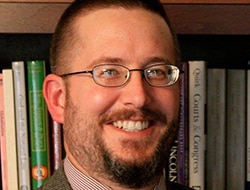
Hospitality is a virtue that most of us associate with times past. We may still, on occasion, refer to the “hospitality industry,” but what restaurants and bars, hotels and cruise ships provide is about as far from hospitality, properly understood, as prostitution is from love. Even the remnants of hospitality — birthday parties, dinner parties, Super Bowl parties — don’t strike as close to the true meaning of the word as “The Beverly Hillbillies” once did: “You’re all invited back next week to this locality / To have a heapin’ helpin’ of their hospitality,” followed by a hearty and heartfelt (as heartfelt as Hollywood could be) “Y’all come back now, y’hear?”
Sitting on my front porch, rereading Walker Percy and writing yesterday about my mentor, Russell Kirk has sent my mind down an unexpected path of thinking about the decline of hospitality, and what its recovery might mean for a society riven by politics, social media and race, among other things. The front porch, of course, was long a symbol of hospitality, because hospitality was never really about extending an invitation but accepting with good grace, good cheer and true charity those who come to you.
Hospitality is never a theme of Percy’s novels, but since they’re all set (at some point, at least) in the South, it’s an ever-present reality. People sitting on a porch greet others dropping in for a visit, food is offered, drinks are poured, and as the night draws on, the guest bedroom is made up. Days or weeks later, the guest moves on.
When I was young, a culture of hospitality still existed in the practice of dropping by. “I was in the area, so I thought I’d drop by” is something few people are likely to say these days, and even fewer would be happy to hear. But it was a reality of life only a few decades back (and still is, to a certain extent, among my relatives). You’d hear that someone was “in town,” and you’d expect a visit. You might even change your plans just to make sure that you would be at home should he or she come by. And if you were the visitor, you’d better be prepared for the question, “Where are you staying?” because it would be asked, and “At the Holiday Inn” was not an acceptable answer. (Depending on the latest family squabbles, “At Cousin So-and-So’s” might not be, either.)
Hospitality is a late medieval word, and like many medieval virtues, it’s an amalgam of the pagan and the Christian: Aristotle’s virtue of magnanimity (greatness of mind and heart, which led to generosity) and Christian charity. Both were present in Dr. Kirk, who (though a white convert to Catholicism from Presbyterianism and the founder of modern American conservatism) over the course of four decades welcomed into his home in Mecosta, Michigan, hundreds of guests of all races, creeds, ethnicities and political persuasions, including political refugees, criminals and (literally) hobos. Some stayed a night; some stayed for days; some for months and even years. A quarter-century later, his widow, Annette, continues the tradition at the “Last Homely House,” as Dr. Kirk called Piety Hill — a reference to J.R.R. Tolkien’s Rivendell.
Russell and Annette’s hospitality wasn’t merely generous; it changed many lives, including ours. I don’t know where I would be today and what I would be doing if Annette hadn’t offered Amy and me a place to stay while I looked for a job after our eldest daughter, Rebekah, was born. All I know is that I wouldn’t be sitting on this porch in Huntington, Indiana, and I wouldn’t be writing these words.
To be hospitable means to put the needs and convenience of others ahead of your own. It’s a sacrifice borne gladly and with generosity. That true hospitality has gone the way of the dodo tells us a lot about our society — and our practice of Christianity. “I was a stranger, and you welcomed me.”
Scott P. Richert is publisher for OSV.





